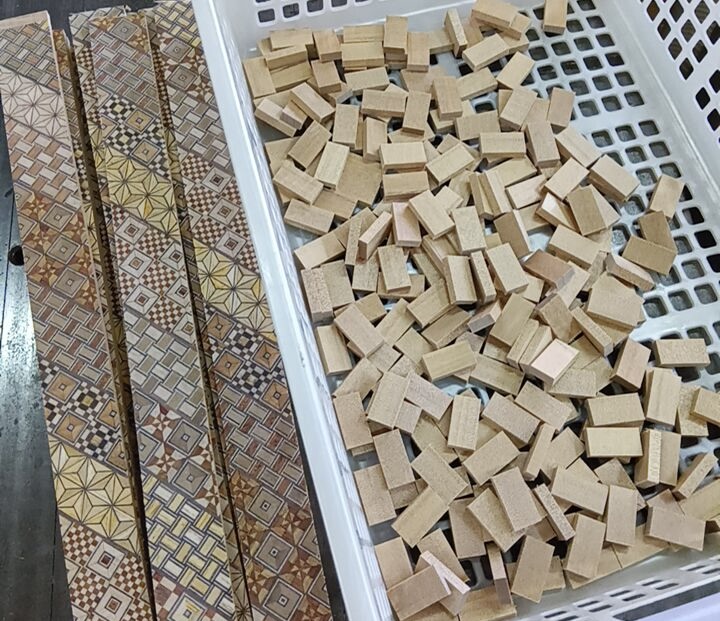26-Sep-2024
Today, I continued working on the 5-sun 27-step Japanese puzzle box. In the morning, I attached the bottom panel to the backside of the top panel that I glued yesterday. This evening, I will attach the side yosegi panels. These side panels are fixed in place with pressure from a tool and left until tomorrow. Since the process of attaching the side yosegi panels doesn’t take much time, I usually start preparing the next three “kanuki(slide keys)” panels or begin my next project. Since today was very sunny and dry, I decided to let the materials for the “kanuki” panels dry more and instead worked on my next project, the “Mame 10-steps puzzle box”.
This time, I am creating everything with traditional yosegi type (27-step boxes). Most of these orders come from shops in other countries, but I’ve made a few extra pieces. The 5-sun 27-step puzzle boxes with traditional yosegi type are always a popular item, and with the Christmas gift season approaching, demand is expected to increase. As shown in the photos of the top panel from yesterday and the bottom panel I worked on this time, the pattern for the 5-sun traditional yosegi-sheet has slightly changed since around summer this year. Though it’s subtle, the yosegi pattern varies slightly with each batch, depending on the preferences of the yosegi craftsmen, meaning the order of the designs is often switched around.
One of the significant changes in the 5-sun design this time, as shown in yesterday’s photo, is that the pattern known as “Asanoha”, arranged diagonally in the center, has been made in a white version. Normally, this pattern is yellow, but sometimes, it comes in white. I have enough of this version of the yosegi to make 300 pieces of 5-sun box , and after that, the design will change again.
As I mentioned first, today I also worked on making the frame for the Mame 10-step puzzle box. While I haven’t assembled it yet, I plan to make around 100 pieces this time, all for the Hakone market. This box also uses the traditional yosegi style, and each box has a different pattern. This is because this puzzle box is made from large sheets of traditional yosegi, and the way the pattern appears varies from box to box. When attaching the yosegi panels, I carefully choose pieces to ensure that no two patterns are too similar, making sure each box displays a variety of designs. I’ll likely continue working on these puzzle boxes tomorrow😊



